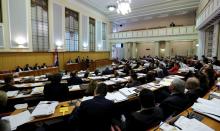Croatian War of Independence
Veterans of the so-called KLA came up with a secret list
Due to their publication, officials of the Kosovo Liberation Army War Veterans' Association Hysni Gucati and Nasim Haradinaj were arrested and accused of undermining the work of the court.
Serbian Municipal Honour for War Criminal Dismissed as ‘Political Game’
The decision of the local assembly of Pantelej, a municipality of the city of Nis, the biggest city in southern Serbia, to make a convicted war criminal, Vladimir Lazarevic, an honorary citizen is not surprising and represents part of the "petty political game" of the ruling party, NGO activists told BIRN.
Croatia Celebrates Anniversary of ‘Storm’ Victory; Serbia Mourns Victims
Croatia's political leadership, wartime generals and war veterans gathered on Thursday in the town of Knin to mark the anniversary of the victorious military offensive, Operation Storm, that practically ended the independence war in the country in 1995.
Part of the ceremony took place at the Knin Fortress, while another part was held at the town's football stadium.
Tudjman’s ‘Freedom Train’: Celebrating Croats’ Victory and Serbs’ Exodus
"Gentlemen, I want to talk a little bit more about [our] promotional focus, given the advantages gained from Storm," Tudjman said as he opened the session.
Croatia Urged to Ease Path for Wronged Serbs to Gain Citizenship
The legal amendments address the problems of around 5,000 people whose parents were Croatian Serbs but were living in Serbia when they were born, when both Serbia and Croatia were part of Yugoslavia.
Croatian MPs Pass Law Giving Benefits to Civilian War Victims
A law that will grant benefits to civilian victims of the 1991-95 war was adopted by Croatian MPs on Thursday with 107 votes in favour, 16 against and five abstentions.
It was passed after heated discussions in parliament about whether the law would also give benefits to people who were part of 'enemy' Serb forces during the war.
Covert Operations: Unravelling Serbian Officials’ Links to Paramilitaries
A senior official from the Serbian State Security Service, Franko 'Frenki' Simatovic, arrived at a covert paramilitary training camp near the town of Ilok in Croatia in the spring of 1992 - one of many that would allegedly be set up by Serbian security officials during the wars that erupted as Yugoslavia collapsed.
Ahead of Verdict, Journalist Recalls War Power of Serbian State Security
Fighting units under the ultimate command of Serbian state security officials Jovica Stanisic and Franko Simatovic "controlled the situation on the ground" in Serb-controlled parts of Croatia and, to a lesser extent, Bosnia during the wars of the 1990s, veteran Serbian journalist Filip Svarm told BIRN ahead of the verdict in the pair's war crimes trial in The Hague.
Pilot’s Killing in Slovenia’s ‘Ten-Day War’ Causes Enduring Controversy
On June 27, 1991, the first day of the armed conflict in Slovenia, what were initially described as two 'enemy' helicopters were shot down by Slovenian troops.
Six months after independence, Slovenia recognised by number of countries
Ljubljana – The first countries recognised newly-independent Slovenia soon after it left Yugoslavia in June 1991, but most of them were brand new independent states themselves. A major wave followed in December and in January 1992, when Slovenia was also recognised by Germany, the Vatican and the EU’s predecessor – the European Community.










